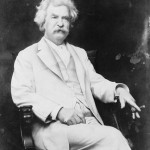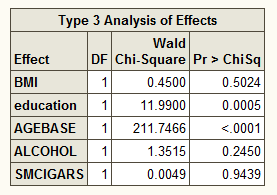Cigar-smoking won’t kill you if you’re already old
In my analysis of data on the oldest old from the Kaiser Permanente study, I started with cigar smoking because I have a friend who turned 65 last month. His annual physical went like this:
Doctor: Do you still smoke cigars?
Jim: Yep.
Doctor: Do you still drink 8 or 9 beers every night?
Jim: Yep.
Doctor: Are you going to quit?
Jim: Nope.
Doctor: Well, see you next year.
You know how old people always tell you that it doesn’t matter if they quit now, because they’re too old to die young anyway? I got to wondering if that was true, if people who were smoking and still alive at age 65 would be any more likely to die. (We’ll save the 8 or 9 beers thing for later.)
 My first analysis was to look at the data by gender because I suspected that men were more likely to smoke cigars and I knew that women have a longer life expectancy. When I did a table analysis by gender and cigar smoking using SAS Enterprise Guide, I found that only one of the 288 cigar smokers in the sample was female. So, it was clear to me if I was looking at the impact of cigar smoking on mortality I should probably only look at men.
My first analysis was to look at the data by gender because I suspected that men were more likely to smoke cigars and I knew that women have a longer life expectancy. When I did a table analysis by gender and cigar smoking using SAS Enterprise Guide, I found that only one of the 288 cigar smokers in the sample was female. So, it was clear to me if I was looking at the impact of cigar smoking on mortality I should probably only look at men.
The average age at death for men who smoked cigars (N=175) was 84.2 years, compared to 84.2 years for men who did not smoke cigars (N=1,147). Since there was some rounding here, p does not equal exactly 1.0 but rather p > .90. So, it does not seem that quitting cigar smoking would improve your life expectancy given you have already made it to age 65.
However, that is only people who died. Perhaps not smoking will increase your probability of survival? Let’s just take a simple chi-square analysis comparing people who smoked cigars to those who did not and seeing what is the probability they died over the nine years they were followed.
Of the cigar smokers, 13.2% died during the nine years participants were followed, compared to 13.1% of men who did not smoke cigars (chi-square = .07, p > .78).
Still, I am not convinced. Maybe cigar smokers were older, or less likely to be overweight or drink (well, I doubt that one). Anyway, being the good little statistician, I ran a logistic regression with death as the dependent variable and BMI, education, age at the beginning of the study (baseline), whether or not the subject had ever drank alcohol and whether or not he smoked cigars as the predictors.
As you can see, the only two significant factors were age (older people were more likely to die in the next nine years – not surprisingly since the study began with people 65 and over) and your education. I’m guessing education is a proxy for social class.
So, it looks as if Jim is okay to keep smoking his cigars, given he has made it this far. I’m still not convinced about the 8 or 9 beers, though. That’s my next analysis.

Surprisingly, I found similar results in my tiny sample of my own elderly family members, AnnMaria. To back this up, one researcher told me stopping smoking is often deemed more stressful to the elderly respiratory system than continuing. I have no experience on the effects of drinking and will watch for your analysis.
And how many cigars did they smoke and were they every day smokers or just occasional smokers.